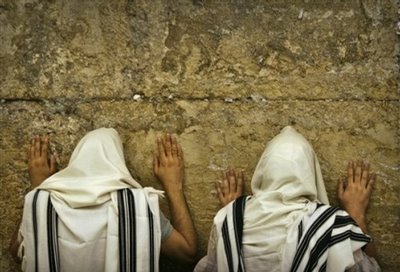The Weekday Amidah: Themes of Jewish Prayer
 Greco-Roman Period
Greco-Roman Period
The Amidah, the core of each prayer service, is said by the individual while standing silently. Also called the “Eighteen Benedictions,” it actually features nineteen essential themes (one was added later), each represented by a blessing beginning with the formula “Blessed art thou, O Lord.” The weekday Amidah includes petitions or requests that are omitted from the Sabbath and holiday Amidah which instead concentrate on the theme of the special occasion. The text reproduced here represents an early version of this prayer representing the liturgy in the Land of Israel.
1 Blessed art thou, O Lord,
Our God and God of our fathers,
God of Abraham, God of Isaac, and God of Jacob,
Great, mighty, and awesome God,
God Most High, creator of heaven and earth,
Our shield and shield of our fathers,
Our refuge in every generation.
Blessed art thou, O Lord, shield of Abraham.
2 Thou art mighty—humbling the haughty,
Powerful—calling the arrogant to judgment,
Eternal—reviving the dead,
Causing the wind to blow and the dew to fall,
Sustaining the living, resurrecting the dead—
O cause our salvation to sprout in the twinkling of an eye!
Blessed art thou, O Lord, who revivest the dead.
3Thou art holy and thy name is awesome
And there is no god beside thee.
Blessed art thou, O Lord, the Holy God.
4 Graciously favor us, our Father, with understanding from thee,
And discernment and insight out of thy Torah.
Blessed art thou, O Lord, gracious bestower of understanding.
5 “Turn us to thee, O Lord, and we shall return,
Restore our days as of old” (Lam. 5-21).
Blessed art thou, O Lord, who desirest repentance.
6 Forgive us, our Father, for we have sinned against thee,
Erase and blot out our transgressions from before thine eyes,
For thou art abundantly compassionate.
Blessed art thou, O Lord, who forgivest readily.
7 Behold our afflictions and defend our cause,
And redeem us for thy name’s sake.
Blessed art thou, O Lord, Redeemer of Israel.
8 Heal us, O Lord our God, of the pain in our hearts,
Remove grief and sighing from us
And cause our wounds to be healed
Blessed art thou, O Lord, who healest the sick of Israel thy people.
9 Bless this year for us, O Lord our God,
And may its harvest be abundant.
Hasten the time of our deliverance,
Provide dew and rain for the earth,
And satiate thy world from thy storehouses of goodness,
And bestow a blessing upon the work of our hands.
Blessed artthou, O Lord, who blessest the years.
10 Blow a blast upon the great shofar for our freedom
And raise a banner for the ingathering of our exiles.
Blessed art thou, O Lord, who gatherest the dispersed of thy people Israel.
11 Restore our judges as of old,
And our leaders as in days of yore,
And reign over us—thou alone.
Blessed art thou, O Lord, Lover of justice.
12 May there be no hope for the apostates,
And speedily uproot the kingdom of arrogance in our own day.
May the Nazarenes and the sectarians 137 perish in an instant.
May “they be blotted out of the book of living,
And may they not be written with the righteous” (Ps. 69-29).
Blessed art thou, O Lord, who subduest the arrogant. 138
13 Show abundant compassion to the righteous converts,
And give us a good reward together with those who do thy will.
Blessed art thou, O Lord, Stay l39 of the righteous.
14 Have compassion, O Lord, our God, in thine abundant mercy,
On Israel thy people,
And on Jerusalem thy city,
And Zion, the abode of thy glory,
And upon the royal seed of David, thy justly anointed.
Blessed art thou, O Lord, God of David, Rebuilder of Jerusalem. 140
15 Hear, O Lord, our God, the voice of our prayers,
And have compassion upon us,
For thou art a gracious and compassionate God.
Blessed art thou, O Lord, who hearest prayer.
16 May it be thy will, O Lord, our God, to dwell in Zion,
And may thy servants worship thee in Jerusalem.
Blessed art thou, O Lord, whom we worship with reverence.
17 We thank thee,
Our God and God of our fathers,
For all of the goodness, the lovingkindness, and the mercies
With which thou hast requited us, and our fathers before us.
For when we say, “our foot slips”
Thy mercy, O Lord, holds us up.
Blessed art thou, O Lord, to whom it is good to give thanks.
18 Bestow thy peace
Upon Israel thy people,
And upon thy city,
And upon thine inheritance,
And bless us all, together.
Blessed art thou, O Lord, Maker of peace.
136. Trans. Heinemann and Petuchowski, Literature of the Synagogue, pp. 33-6 based on text published by
S. Schechter, “Genizah Specimens,” JQR O.S. 10 (1898), pp. 656-8.
137. Jewish Christians and Gentile Christians.
138. This blessing was modified in the time of the rise of early Christianity to insure that those who were
minim (Jewish Christians) would not serve as leaders of the prayers in the synagogue. When the separation
of the Jewish Christians from the synagogue was accomplished, the prayer was retained as a general
malediction against all the enemies of Israel.
139. Supporter, sustainer.
140. This benediction is a prayer for the restoration of the Davidic House and rebuilding of Jerusalem in the
messianic era.



